
Ulrike Reinhard is The Nomad 🙂
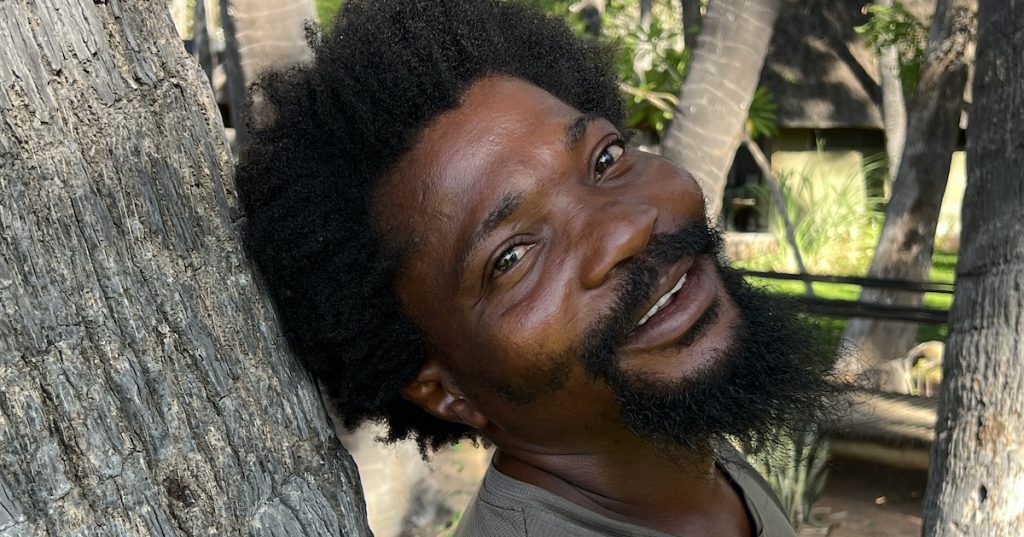
This is Owen Kataparo Muhenjeq, an activist who walked Namibia to raise awareness for environmental issues
A friend told me, if you go to Epupa Falls (North West of Namibia at the border to Angola), look out for Owen. And this is what I did. I arrived at the Epupa Falls Lodge, right in front of the mighty Cunene river and I asked for Owen. He was standing right behind me 🙂 And it was his birthday! The same day the WWF is celebrating its World Wildlife Day. Coincidence?
We hugged each other, I showed him my recommendation and the ice was broken.
Owen turned 47 years old the day I met him. He was born in Kaokoland, a rough, tough, sparsely inhabited area in north west Namibia. Its beautiful landscape and richness in animals makes it a truly unique place. It is hardly developped and the roads are pretty bad. It is quite an adventure to cruise around in his home area which is 180 km west of Epupa. It is where Namibia’s toughest pass, the Van Zyls Pass, is challenging the drivers.
Owen was named after the famous British conservationist Garth Owen-Smith whom he cherishes. His father was a conservationist as well – conservation is so to speak in Owen’s blood. Owen arrived at Epupa Falls all alone when he was 15 years old – he was at school at home, finished school close to Epupa, learned English and did valuable research on how to save the Cunene river and its region towards its mouth from man-made floods. He considers himself an activist. His voice was heard in BBC documentaries and other well-known programs.
Despite his birthday he took me to the Water Falls the day I arrived and and he showed me around. He is a guide. All cash is needed these days – life is not easy up there in the north. And the tour would guarantee him some birthday beers in the evening 🙂
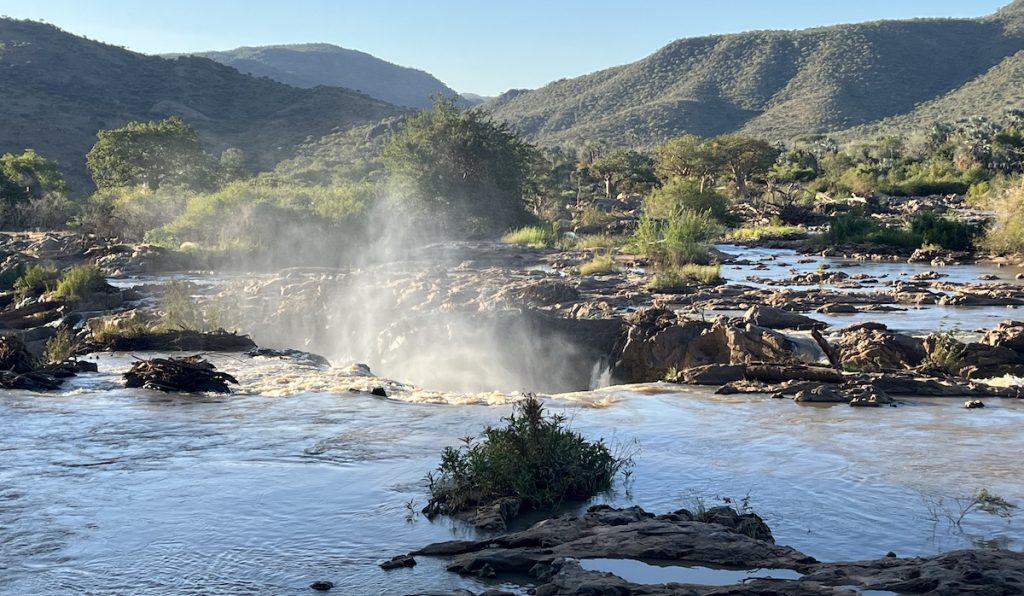
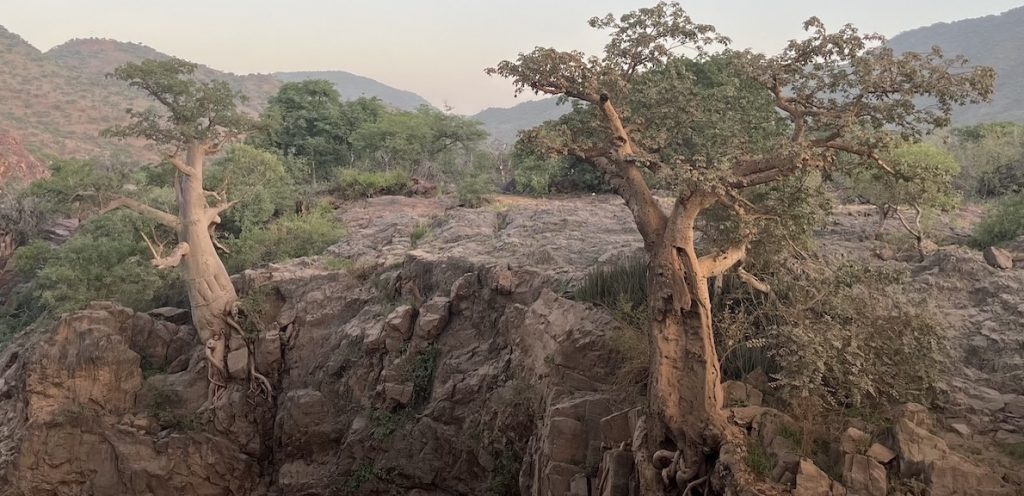
The Epupa Falls, Baobab trees at the Epupa Falls
I interviewed Owen and asked him about conservation, the mighty Cunene River and his life in Epupa.
The Guy Who Walked Namibia
Our conversation started with Owen remembering when his father first took him out into nature, when he was a little boy. He recollects: I fell in love with nature when I was a little boy. This is really something very special about me. I just love nature and this has a lot to do with my father. The first time we drove out with my father and Garth Owen-Smith, the man I was named after, I saw a giraffe. It was love at first sight. I fell in love with this animal – the way it walks, it is so beautiful – just like a beautiful lady.
At the end of the day, my father was calling me and we sat down at the camp fire. He said to me: “Do you know, that a giraffe can kill a lion with one kick?” “No”, I said, “I don’t know, I am still young. How can I know?” “And at the same time”, the father continued, “when a lion is hunting a giraffe and the giraffe gets tired after many kilometers of running, it stopps, turns around and looks straight in the eyes of the lion and the giraffe starts crying. It gets tears – just like a human being!”
I was stunned. Since then I am in love with the giraffe.
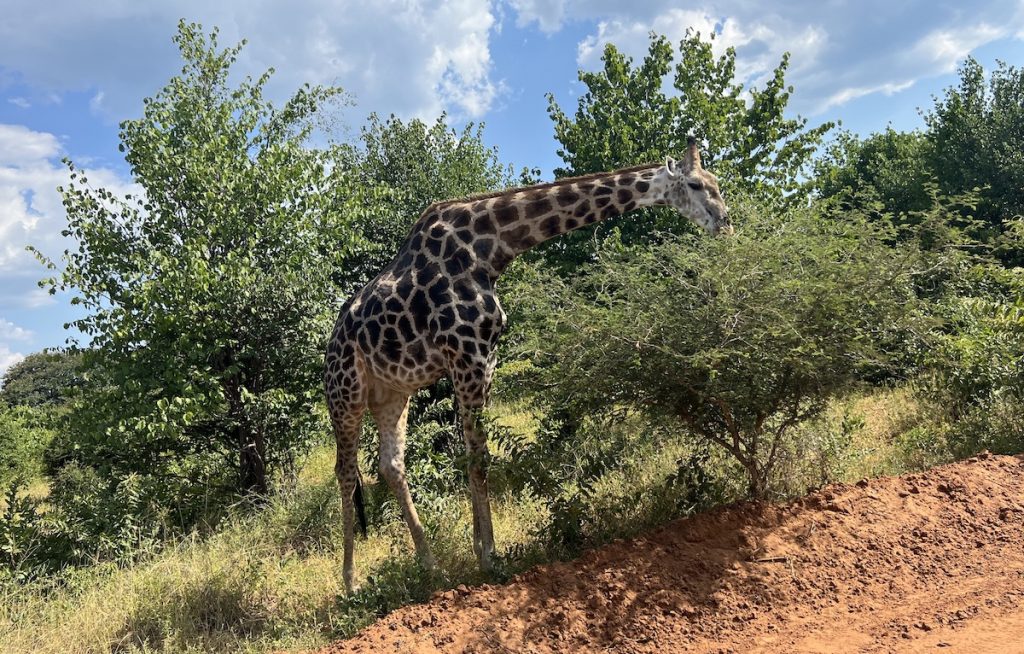
This photo was taken in Chobe river region, Botswana.
What does conservation mean for you?
If you don’t conserve, you don’t have food. It’s that simple. It is like the money you have in your personal bank account. You always calculate, what you must save and what you can let go. This is conservation for me. At some point – for me as an environmental activist – it can get very strange. I need to remind myself – despite my deep love for nature and all the animals – we cannot save and protect everything. Sometimes we must allow to take out from nature, even to kill animals if it is necessary. There needs to be a wise balance. This balance is very important.
To find this balance and keep it wisely going is so important for the upcoming future generation. We have to get better at this – it is really a give and take on an equal basis.
Owen, you’ve been most of your life here in this area. What has changed along the Cunene river?
A lot of things have changed since I was born. The great mighty Cunene has changed, it was destroyed my man-made floods. I can say this because I have walked from here to Windhoek, 936 km in 26 days, to raise awareness for the destruction which is going on and to safe the Cunene river.
Man-made floods have destroyed the whole nature.
What do you mean by man-made floods?
We have four dams along the Cunene river. Three of them are up in Angola, one is in Namibia. The Namibian one was built for electricity, the others are for irrigation. The cooperation between the two countries doesn’t really work well, even though it is part of the Angolan Constitution. They control the flow of the water. They decide when they open the dams and when they don’t.
I’ve spoken with many people on my walk to Windhoek. I wanted to understand all viewpoints – and more than 90% of the people were telling me, these floods are man-made. Especially old people remember the days before the dams when everything was still natural. There was a balance. Now they open the dams and the water runs and destroys the land while at other times the river down here has only less water. Because of the floods we here in Epupa have lost our beautiful island which used to be in the middle of the river – it was just washed away when the water came. Our cattle and goats used to graze there. There were plenty of birds nesting and a lot of trees. It was gone in four minutes in 2011.
What are the impacts of these man-made floods?
The natural balance is disturbed. Birds are gone. Trees. The environment is changing – we either have too much water, floods, or there is less water. We still have to see where this will go. Our elders are concerned because they know how it was earlier and they keep telling me, the dams are destroying the river and its economic and natural life around it.
When did you walk to WIndhoek? What was the outcome?
I walked to Windhoek in 2020, during COVID. But I also walked to many other other places in Namibia as well. The walk to Windhoek was mainly to safe the mighty Cunene. I’ve spoken to so many people and I did a lot of research. I listened to what they had to say – and therefore I am convinced these dams are causing the trouble.
This walk was financed by the communities along the river. Not that they have given me money, poverty is extreme in this are. No, I didn’t receive money – but the communities gave me shelter and food. And this entire community effort was heard by our government and put pressure on the authoriteis and they reacted. The community which stood behind me, turned my walk into a powerful movement. And since then the dams weren’t opened in the way they were opened before!
As I was walking I also addressed the plastic pollution and other environmental issues in the country. The plastic waste is a big problem. Our people are just not educated enough to know and understand the impact of plastic waste. They don’t really know the different impact of a stone or a plastic bottle. Their educational level is not up to the mark – we need to teach this in our schools and raise awareness through NGOs. Our people need to learn about the disadvantages and the negative effects of plastic waste. That the plastic the animals eat will end up in their very own bodies when they eat the meat. We still have a long way to go in this field, we are just starting.
It is crucial that we raise money for education programs and get these out in the communities.
Do you have any plans to found an NGO which is tackling this issue?
Well, it is hard to say at this moment. Business and therefore money is not enough in this region. We need to develop tourism while at the same time educate. We need to invest in better tourist infrastructure, then we can build ourselves better houses and start learning. Currently we are all struggling to survive. We need to get the economy going, then the other things will follow.
I myself have bought a boat last year. It just arrived this year and now I can offer more valuable tourist activities …. and the circle starts. We need to create a system where money goes back to the people in a big part. It is not about enriching yourself – the community needs to be included. We need to learn how to share. Wealth is not equally distributed here. Only then we can tackle environmental issues.
How would you describe this pristine area here, Owen? Give me five words for it!
It’s a home with no stress! An oasis! You get the fresh breeze from the ocean running up the Cunene Valley – this in combination with an ice cold beer. it’s hard to beat!
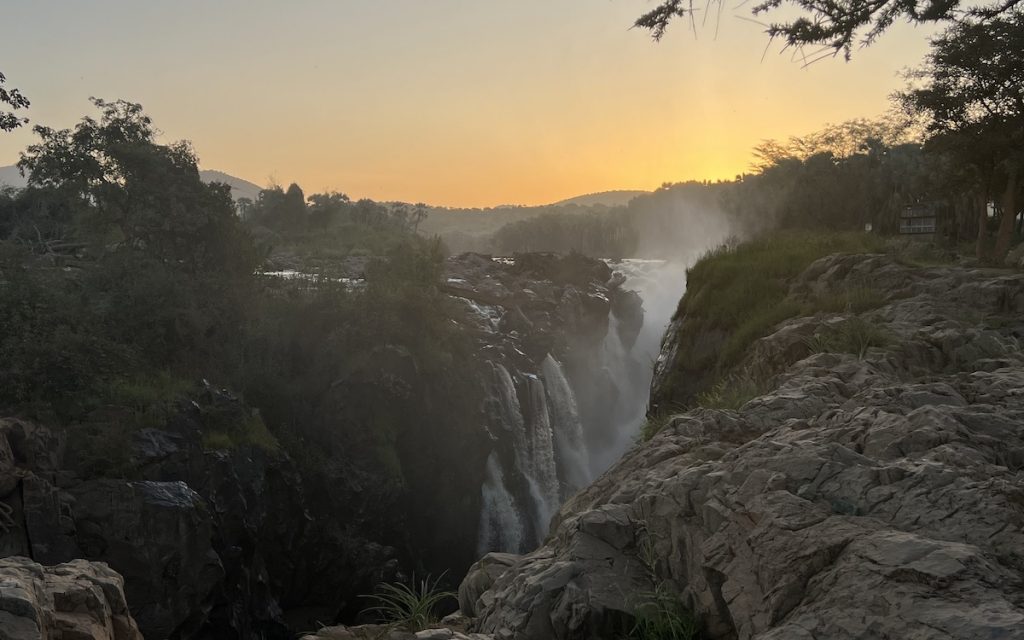
Cunene river falling at Epupa
The interview was conducted in early March 2023.
Places to stay at Epupa Falls: The Epupa Falls Lodge – you are just in front of the falls, Omarunga Lodge (Gondwana) – this one has WiFi.
How to reach: The Epupa Falls are 200 km north of Opuwo. They can be reached from Opuwo with a local shared taxi. It takes about 4 hours.
One thought to “The Guy Who Walked Namibia”
Pingback: Interview about my travels – Ulrike Reinhard